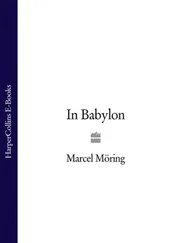* * *
The Manoscrivis were the first to arrive, at the same time as Nasser and Claudette El Ouardi. A brilliant, austere couple. I knew Nasser from Font-Pouvreau where he was working as an attorney for the EU. He had since set up his own practice in industrial-property law. Claudette is a researcher in bioinformatics. Lydie and Jean-Lino had already introduced themselves at the door as people who’d gone through enormous hardship traveling so far to get to our place. The El Ouardis laughed politely at the joke. The Manoscrivis brought a bottle of champagne and Jean-Lino held a bouquet of small mauve roses with their stems cut very short. Before Jeanne and her ex-husband Serge arrived, we were briefly just the six of us. An absurd void, hesitation, silences, the two couples having settled into opposite ends of the couch, while Pierre and I, half-up and half-down, fussed with drinks or the crudité plates. Jean-Lino was sitting forward on the edge of the cushion, his comb-over firmly plastered to his pate, hands clasped between his spread knees, in a posture of confident expectation. He was wearing a lavender shirt in an American cut, quite elegant I thought, and eyeglasses I didn’t recognize—half-round frames the color of sand. Lydie passed around the celery sticks. Not a word took root, no exchange caught on. Silence greeted the end of every sentence. At one point Nasser mentioned Boulevard Brune, and Lydie exclaimed, “Ah, Boulevard Brune, we’re doing our next jam session there!”
“Jam?” Nasser said. “What does that mean?”
“Jazz sessions, in public,” Lydie answered, smiling broadly.
“Ah, nice . . . very nice. You play an instrument?”
“I sing.”
“You sing. Bravo.”
Jean-Lino nodded with pride. I added, “She sings very well,” and all acquiesced with kindly murmurs. You’d expect some further talk, some minimal curiosity, but no—the conversation fell back into the yawning hole it had risen from. I glanced outside and saw snowflakes. It was snowing! On the first day of spring! “It’s snowing!” I cried. I opened the windows. The cold air rushed in. It was snowing. Not little flakes, either—the beautiful heavy flat kind. Everyone rushed out onto the balcony. Claudette and Lydie leaned over the balustrade to see if they melted when they hit the ground. The men said, “It won’t last,” the women said, “It’ll last.” People started talking about the climate, the seasons, the I-don’t-knowwhat, everything. Pierre opened a bottle of champagne and the cork shot out among the snowflakes. “Polluter!” Lydie cried. We all laughed as we drank a toast. Pierre told a story about Emmanuel when he was little.
They’d gone off for a week together, father and son, to winter sports in the Alps. They were sharing a room in a hotel that had a sauna in the basement. Coming back up into the room one evening, all relaxed in his robe, Pierre found Emmanuel in tears in front of the TV. “What’s wrong?” “It’s snowing in Paris!” “Here too, darling, look how pretty it is outside,” Pierre said. “The sunset on the mountaintops!” “I want to go back to Deuil-l’Alouette!” the boy wailed. He was rolling around on the bed, howling, throwing off whatever his hand fell on, inconsolable at missing the snow in Deuil-l’Alouette. In the end, Pierre threw the remote at him. The thing exploded against the wall, Emmanuel claiming he’d ducked just in time, Pierre always insisting he’d aimed to the side. “Snow, which is to say, my childhood, which is to say, happiness” —even though it’s not true for me, I always think of that line of Cioran’s. Rushing into the kitchen with her cake, Jeanne said, “I nearly broke my neck on your sidewalk!” as if we were responsible for the change in weather. She was wearing some unusual sandals, lashed to her feet with thongs, whose purchase I understood a moment later on seeing her photos of the S&M equipment. Thanks to the snow, the party took off.
People arrived damp and effervescent, in quick sequence. Jeanne’s ex-husband Serge (they separated eight years ago, on good terms, and we’ve all stayed close) appointed himself to door duty, answering the intercom, helping with the coats, improvising introductions. My pal Danielle, who handles documentation at the Pasteur, arrived very upset as well. She had just buried her stepfather that day. At the hospital, when her mother saw the body in its coffin, she had cried, “But Jean-Pierre didn’t have a mustache!” The attendant who’d prepared the body had shaved him badly and the shadow beneath the nostrils gave him a Hitler look. When Danielle told that story I remembered the flat tight hairdo, with a harsh part, they’d given my aunt at her funeral—a woman who her whole life had kept up a constant succession of permanent waves and big bouffants. When she was rotting in a retirement home her husband, who to use my mother’s expression had never quit “chasing skirts,” gave away all her clothes to the Little Sisters of the Poor, except for the outfit she would need to be buried in. “Jean-Pierre didn’t have a mustache!” Danielle’s mother kept repeating in a frantic tone (Danielle reproduced it perfectly). She apparently went rushing around the room, flinging herself against the walls time and again. In a firmly sane voice Danielle said, “Mama, calm down, we’re going to fix it.” A man came in, she pointed out the shaving problem, her mother kept saying, “My husband didn’t have a mustache!” The man tiptoed back in with a shaving kit. The hairless and powdered Jean-Pierre who emerged bore no greater resemblance to the familiar Jean-Pierre, but her mother leaned into the coffin over the recumbent figure and said, “Oh you are so handsome my darling Pilou!” Later, emerging into the corridor, unsteady and near collapse, she said “You’ve got to take serious care of me now, Danielle darling, what are you doing tonight? I could cook us a little veal roast, with mushrooms?” Well, girl, Danielle said to herself, so long to partying with your pals, you can’t leave your mother all alone tonight. I remarked that I myself had never had a double who called me “girl” and kept me from doing dumb things. “Well, my double does call me ‘girl,’” Danielle said, “but I don’t listen to her.”
“So you did leave her all alone?”
“I handed her over to one of her neighbors, but I’ve got to have a stiff drink right this minute!”
“You should have brought her along.”
“You’re insane! Give me a break!” Danielle cried, tossing back a glassful.
From that moment on, Mathieu Crosse, a colleague of Pierre’s, started prowling around her. I was in the kitchen slicing a quiche when Emmanuel turned up by surprise, all expansive and beaming like a boy with three parties ahead of him. He seemed astonishingly young among us. He was. The Lallemants arrived with a chicken spice loaf and a book for Pierre from Lambert wrapped in gift paper. Pierre accepted the package gracefully and set it down on a table without unwrapping it. I said, “No, open it! He never opens anything anymore!” It was a first edition of Tartakower’s Breviary of Chess . A very thoughtful present, because Pierre had been mourning the loss of his boyhood copy. I said, “He never unwraps packages lately, it’s a new thing with him.”“Am I heading the same way as my father?” Emmanuel said. “I buy clothes and then I don’t take them out of the bag and it’s a good two weeks before I put them on.” “Because you’re too young,” Pierre said. “You’ll see, one day you won’t put them on at all.” Marie-Jo Lallemant fluffed her wet hair with a kind of sensuous pleasure. “So what are you up to these days, Manu?” I heard her accost Emmanuel, in the tone of someone his own age. She’s an orthoptist, and sees herself as a chum to young folks. “Digital marketing,” said Emmanuel. “Oh, great!” While I looked for a tray to serve the chicken loaf, I heard phrases like “We set up content sites for B2B companies” and saw Marie-Jo giving complicit nods. “Digital is way more fun than, like, financial planning!” Marie-Jo was totally with him on that.
Читать дальше

![Ясмина Сапфир - Охотница и чудовище [СИ]](/books/35157/yasmina-sapfir-ohotnica-i-chudoviche-si-thumb.webp)
![Ясмина Реза - Бог резни [=Бог войны]](/books/63616/yasmina-reza-bog-rezni-bog-vojny-thumb.webp)
![Ясмина Реза - Бог войны [=Бог резни]](/books/63617/yasmina-reza-bog-vojny-bog-rezni-thumb.webp)








